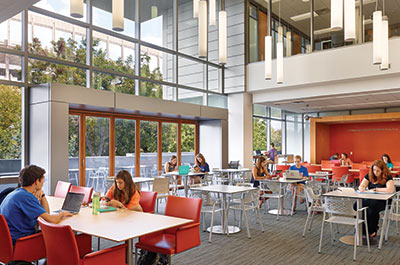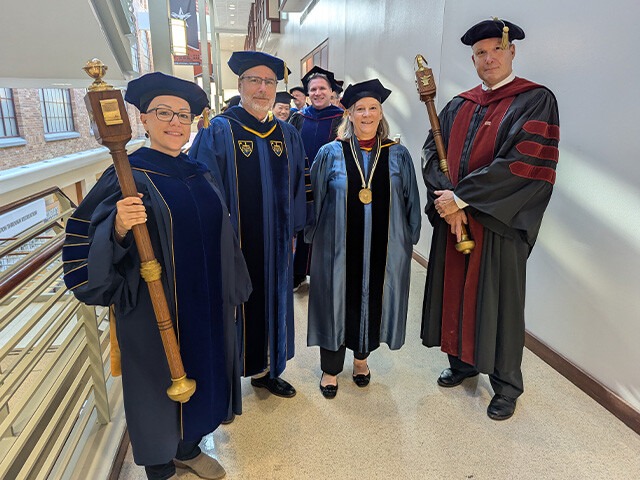
Welcome to the Department of Government
Engage in the highest of human callings

Photo Credit.
As one of the liberal arts, Government - also called political science - teaches students how to think and communicate about politics. A Government major can dissect and evaluate actual or proposed courses of political action by analyzing the evidence for and against them, setting them in historical and comparative perspective, and relating them to ends that are prized or feared.
A Government major is an intellectual jack-of-all trades who is fitted for any career that demands thought, analysis, reading, writing, and speaking about complex organizational and public matters. He or she can write a business memo, understand and evaluate a Supreme Court decision, analyze a chain of command, comprehend the impacts of government policies on public and private domains, and see how the private and the public are entwined in all modern societies. Armed with such knowledge and skills, Government majors go on to become leaders in many arenas - the law, a host of governmental and non-governmental organizations, academia, the media, the military, political parties, and a great many social and political movements.

City, State: Constitutionalism and the Megacity (2020), by Ran Hirschl
More than half of the world's population lives in cities; by 2050, it will be more than three quarters. Projections suggest that megacities of 50 million or even 100 million inhabitants will emerge by the end of the century, mostly in the Global South. This shift marks a major and unprecedented transformation of the organization of society, both spatially and geopolitically.
Learn More
Mobilized by Injustice: Criminal Justice Contact, Political Participation, and Race (2020), by Hannah Walker
Springing from decades of abuse by law enforcement and an excessive criminal justice system, members of over-policed communities lead the current movement for civil rights in the United States. Activated by injustice, individuals protested police brutality in Ferguson, campaigned to end stop-and-frisk in New York City, and advocated for restorative justice in Washington, D.C.
Learn More
The Appearance of Corruption: Testing the Supreme Court's Assumptions about Campaign Finance Reform (2021), by Daron R. Shaw, Brian E. Roberts, and Mijeong Baek
The sanctity of political speech is a key element of the U.S. Constitution and a cornerstone of the American republic. When the Supreme Court linked political speech to campaign finance in its landmark Buckley v. Valeo (1976) decision, the modern era of campaign finance regulation was born.
Learn More
Trump and Us: What He Says and Why People Listen (2020), by Roderick Hart
Why did 62 million Americans vote for Donald Trump? Roderick P. Hart turns to Trump's words, voters' remarks, and media commentary for insight. The book offers the first systematic rhetorical analysis of Trump's 2016 campaign and early presidency, using text analysis and archives of earlier presidential campaigns to uncover deep emotional undercurrents in the country and provide historical comparison.
Learn More
Betting on the Farm: Institutional Change in Japanese Agriculture (2022), by Patricia Maclachlan
Japan Agricultural Cooperatives (JA), a nationwide network of farm cooperatives, is under increasing pressure to expand farmer incomes by adapting coop strategies to changing market incentives. Some coops have adapted more successfully than others. In Betting on the Farm, Patricia L. Maclachlan and Kay Shimizu attribute these differences to three sets of local variables: resource endowments and product-specific market conditions, coop leadership, and the organization of farmer-members behind new coop strategies.
Learn More
The Language of Political Incorporation: Chinese Migrants in Europe (2021), by Amy Liu
In this groundbreaking study, The Language of Political Incorporation, Amy Liu focuses on Chinese migrants in Central-Eastern Europe and their varying levels of political incorporation in the local community. She examines the linguistic diversity of migrant networks, finding institutional trust and civic engagement depend not on national identity, but on the network’s linguistic diversity—namely, whether the operating language is a migrant’s mother tongue or a lingua franca.
Learn More


Add Video Headline Here
Add video description here.
This year in government, 2024-2025
A recap of the Department of Government's 2024-2025 academic year.
View the Newsletter
Photo Credit.
Contact Us
Government
Amy Liu
The University of Texas at Austin
BAT 2.116, Mailcode A1800, Austin, TX 78712
512-471-5121
